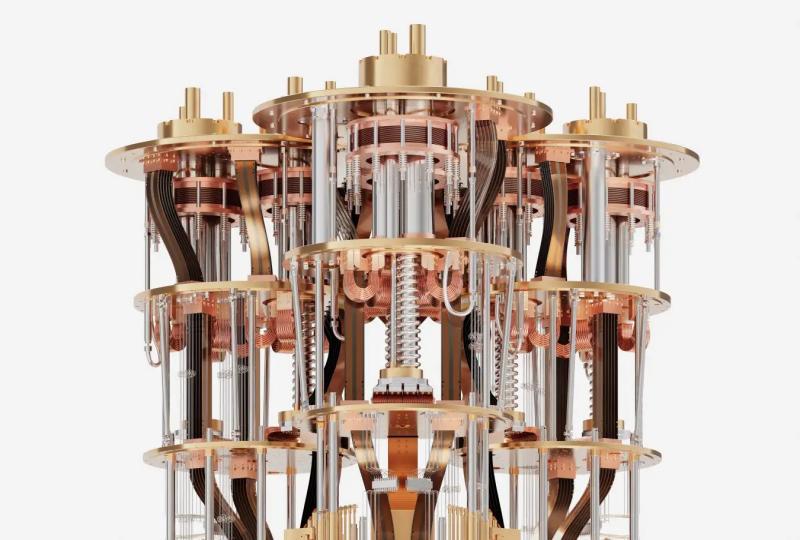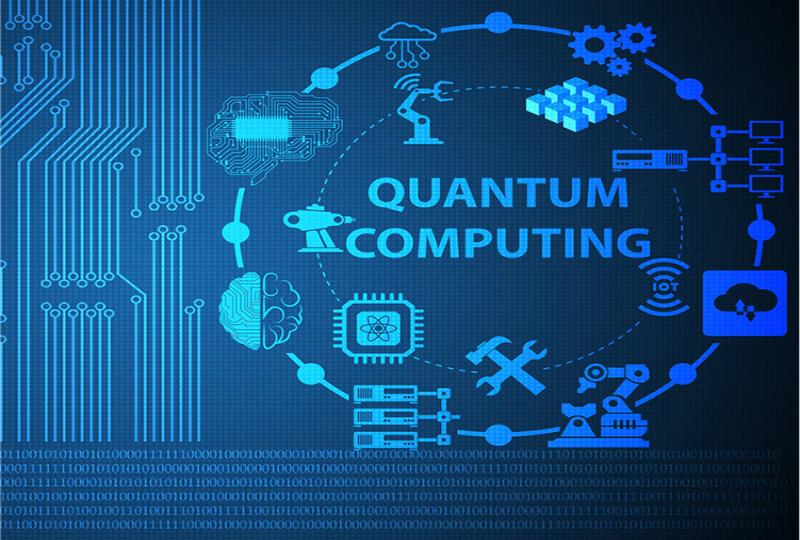What Is Quantum Computing? Full Beginner Guide 2025
2025.04.29 · Blog
What Is Quantum Computing?
Quantum computing is a revolutionary field of computing that harnesses the principles of quantum mechanics to process information in fundamentally different ways than classical computers.
In classical computing (used in today's computers), information is processed using bits that can be either 0 or 1. However, in quantum computing, the basic unit of information is called a qubit, and it can be 0, 1, or both at the same time (thanks to a concept called superposition).
Quantum computers also use a special property called entanglement, which links qubits together so they can work as a team to solve problems faster.
Example of Quantum Computing in Simple Terms
Imagine trying to find the shortest path through a maze. A classical computer checks one path at a time, but a quantum computer can explore many paths simultaneously, making it much faster at solving certain kinds of problems.

Key Concepts of Quantum Computing
#1 Qubits
Quantum bits, or qubits, are the fundamental units of quantum computing. Unlike classical bits that can only be in a state of 0 or 1, qubits leverage quantum mechanics to exist in a combination of states (0, 1, or both simultaneously) due to superposition. A few of the more common types of qubits in use are as follows:
-
Superconducting qubits: Tiny loops of superconducting material.
-
Trapped ions: Charged particles confined by electromagnetic fields.
-
Photon-based qubits: Using the polarization or path of light particles.
#2 Superposition
Superposition in quantum computing refers to the ability of a quantum bit (or qubit) to exist in multiple states simultaneously.
Unlike classical bits, which are either 0 or 1, qubits can be in a superposition of both 0 and 1 at the same time. This fundamental concept of quantum mechanics allows quantum computers to perform complex computations in parallel, potentially making them exponentially more powerful and faster than classical computers for certain tasks.
#3 Entanglement
Entanglement is a unique quantum phenomenon where qubits become interlinked such that the state of one qubit instantly influences the state of the other, even over large distances. This property is key to quantum computing's power, enabling:
-
Faster computation through coordinated operations.
-
Applications in secure quantum communication (quantum cryptography).
#4 Quantum Interference
Quantum interference uses the wave-like nature of quantum systems to amplify correct computational paths while canceling out incorrect ones. This process helps refine the results of quantum algorithms, such as Shor's algorithm (used for factoring) and Grover's algorithm (used for searching).
#5 Decoherence
Decoherence occurs when a qubit loses its quantum properties due to interaction with the surrounding environment. For example:
-
Noise from temperature fluctuations, electromagnetic interference, or other factors can disrupt superposition and entanglement.
-
Measurement collapses the quantum state into a classical state prematurely.
Decoherence poses a significant challenge for quantum computers, as it limits the time qubits can remain in their quantum states (coherence time). Overcoming decoherence requires advanced error correction techniques and isolated environments, such as cryogenic systems for superconducting qubits.
How Does Quantum Computing Work?
In essence, quantum computing uses superposition, entanglement, and interference to perform complex calculations, with decoherence being a key obstacle to overcome.
Quantum computing leverages the principles of quantum mechanics to process information. At its core are quantum bits (qubits), which can exist in a state of superposition, meaning they can represent both 0 and 1 at the same time. This enables quantum computers to explore multiple solutions simultaneously, enhancing computational efficiency.
Entanglement links qubits so that the state of one affects the state of another, allowing coordinated operations. Quantum interference then amplifies correct paths and cancels out errors, refining the results.
However, decoherence occurs when qubits lose their quantum state due to environmental interference, posing a challenge. To counter this, quantum computers must be maintained in isolated, stable environments, often at extremely low temperatures.

What Are the Differences Between Quantum Computing and Classical Computing?
|
Aspect |
Classical Computing |
Quantum Computing |
|
Basic Unit |
Bit (0 or 1) |
Qubit (0, 1, or both at the same time — superposition) |
|
Information Processing |
Deterministic: follows clear, sequential steps |
Probabilistic: leverages quantum phenomena like superposition and entanglement |
|
Parallelism |
Limited: needs multiple processors to handle tasks simultaneously |
Inherent: a qubit can represent multiple states at once, allowing massive parallelism |
|
Hardware |
Silicon-based transistors (CPUs, GPUs) |
Superconducting circuits, trapped ions, photons, or other quantum systems |
|
Speed |
Very fast for everyday tasks but can struggle with highly complex problems (e.g., factoring large numbers) |
Potentially exponentially faster for specific problems like factoring, simulating molecules, optimization |
|
Error Handling |
Well-established error correction methods |
Quantum error correction is complex and still evolving |
|
Applications |
General-purpose computing: browsing, gaming, data processing, machine learning, etc. |
Specialized: cryptography (breaking/enhancing security), quantum simulation, optimization, materials science |
|
Scaling |
Relatively easy to scale (Moore's Law, though slowing) |
Very challenging to scale (requires maintaining quantum coherence) |
|
Current Maturity |
Mature and widespread |
Emerging and experimental, but rapidly advancing |
Simple analogy:
-
Classical computers are like very fast librarians who search books one by one.
-
Quantum computers are like magical librarians who can read many books at once
What Are the Latest Breakthroughs in Quantum Computing?
Several top quantum computing companies are heavily investing in quantum technology.
On Dec 9, 2024, Google introduced an experimental quantum computer capable of performing in just five minutes a calculation that would take the world's fastest supercomputers approximately ten septillion years—far longer than the age of the known universe. Their latest quantum chip, named Willow, is designed to address one of the most significant challenges in quantum computing: quantum error correction (QEC).
More recently, in February 2025, Microsoft made headlines by announcing the discovery of a new state of matter, which could pave the way for significant quantum breakthroughs. After 17 years of research, Microsoft revealed its Majorana 1 quantum chip, which leverages a material known as a "topological qubit." This material exhibits unusual properties—its particles are neither solid, liquid, nor gas.
Although further validation is needed, Microsoft believes that the chip could dramatically accelerate innovation in areas such as drug development, battery technology, and artificial intelligence. Many researchers are optimistic that topological qubits will enable simpler and more effective error correction while mitigating the problem of quantum decoherence, where quantum systems lose their unique quantum behavior and revert to classical physics.
What's the Relationship Between Quantum Computing and AI?
Quantum computing and artificial intelligence (AI) are two cutting-edge fields that can significantly enhance each other. Quantum computing has the potential to dramatically accelerate AI by processing and analyzing vast amounts of data much faster than classical computers. Thanks to quantum properties like superposition and entanglement, quantum computers can explore many possible solutions at once, making tasks such as training complex machine learning models more efficient.
In turn, AI can also help optimize quantum computing. Machine learning algorithms are being used to improve quantum error correction, optimize quantum circuit designs, and even discover new quantum algorithms. As both fields advance, their combination could lead to breakthroughs in areas such as drug discovery, materials science, financial modeling, and the development of more powerful AI systems themselves.
In short, quantum computing can make AI faster and more powerful, while AI can help quantum computers become more reliable and effective.
To learn more about this exciting synergy, check out our detailed article on How Quantum Computing Will Revolutionize AI Development.
What Are the Challenges in Quantum Computing?
While quantum computing holds incredible promise, it also faces significant challenges that must be overcome before it can reach its full potential.
1. Quantum Decoherence and Noise
Quantum systems are extremely sensitive to their environment. Even the slightest disturbance—such as a tiny vibration or temperature fluctuation—can cause quantum bits (qubits) to lose their quantum state, a phenomenon known as decoherence. Managing and minimizing noise is one of the biggest technical hurdles.
2. Quantum Error Correction
Because qubits are fragile, quantum computers are highly prone to errors. Developing effective quantum error correction methods requires a large number of additional qubits, making scalable, fault-tolerant quantum computing very difficult with today’s technology.
3. Quantum Hardware Scalability
Building a quantum computer with just a few dozen qubits is already challenging. Scaling up to thousands or millions of qubits—necessary for solving practical, real-world problems—requires advances in manufacturing, cooling, and architecture.
4. Quantum Algorithm Development
Quantum algorithms must be specially designed to take advantage of quantum mechanics. Currently, only a handful of quantum algorithms offer clear advantages over classical ones, and creating new, efficient algorithms remains a major area of research.
5. Quantum Talent Shortage
Quantum computing is a highly specialized field that demands expertise in physics, computer science, and engineering. There is a global shortage of skilled researchers, developers, and engineers capable of pushing the field forward.
6. High Costs and Complex Quantum Infrastructure
Quantum computers often require ultra-low temperatures, sophisticated shielding, and specialized environments to operate. Setting up and maintaining such systems is extremely expensive and technically demanding.
What Are the Quantum Computing Use Cases and Business Applications?
Quantum computing is poised to transform a wide range of industries by solving problems that are too complex for classical computers. Here are some of the most promising use cases and business applications:
#1 Drug Discovery and Healthcare
Quantum computers have the potential to significantly enhance our understanding of complex biological systems, a crucial step toward improving drug discovery and development.
By simulating how drug candidates interact with biological molecules, quantum computing could lead to the creation of more effective treatments.
For instance, Google, working with pharmaceutical company Boehringer Ingelheim, has demonstrated that quantum simulations can model the structure of Cytochrome P450 — a key human enzyme involved in drug metabolism — with greater speed and accuracy than traditional computers. This breakthrough could help optimize how new medications are designed and tested.
#2 Financial Services and Risk Management
Banks and financial institutions are exploring quantum computing to optimize investment portfolios, improve risk analysis, enhance fraud detection, and perform complex simulations for market behavior predictions.
Also Read: How Quantum Computing Benefits Financial Services [2025]
#3 Supply Chain and Logistics Optimization
Quantum algorithms can efficiently solve complex optimization problems, such as minimizing delivery times or reducing costs across large-scale supply chain networks, leading to significant operational improvements.
#4 Artificial Intelligence and Machine Learning
Quantum computing could dramatically enhance machine learning algorithms by speeding up data analysis, improving pattern recognition, and training AI models much faster than classical systems allow.
#5 Building Better Batteries
As global energy demands continue to grow, the need for more efficient and environmentally friendly energy storage solutions becomes critical.
Quantum simulations can help design more efficient solar cells, optimize energy grids, and develop better battery technologies. This can lead to more sustainable and cost-effective energy solutions.
Google has explored how quantum computers could assist in designing advanced battery materials. In collaboration with BASF, Google researchers showed that quantum simulations could more accurately model Lithium Nickel Oxide (LNO), a promising but challenging material used in batteries. Better understanding LNO's chemical behavior could improve manufacturing processes and reduce reliance on less sustainable materials like cobalt, paving the way for more powerful and eco-friendly batteries.
#6 Cryptography and Cybersecurity
Quantum computing poses both a threat and an opportunity for cybersecurity. While it could break many existing encryption methods, it is also driving the development of quantum-safe cryptography to secure future communications.
#7 Materials Science and Manufacturing
Quantum simulations can uncover new materials with unique properties, leading to breakthroughs in industries like aerospace, electronics, and automotive manufacturing.
#8 Unlocking Fusion Energy
Fusion energy holds the promise of providing clean, limitless power by replicating the processes that power the stars. However, building practical fusion reactors requires extremely accurate simulations of material behavior under intense conditions — a task that currently demands enormous classical computing resources with limited accuracy.
Google, in collaboration with Sandia National Laboratories, has demonstrated that quantum algorithms running on fault-tolerant quantum computers could model fusion processes far more efficiently. These advancements could be key to overcoming major barriers in achieving sustainable fusion energy on a practical scale.
Curious about more ways quantum computing is shaping real-world solutions? Check out our guide on Top Quantum Computing Applications in Key Industries [2025].
Recommended Articles about Quantum Computing
23 Leading Quantum Computing Companies Worldwide [2025 List]
Superconducting Quantum Computing: Breakthroughs & Insights
Cloud-Based Quantum Computing: How it Works?
Who Was the First Quantum Computing Company? A Deep Dive [2025]
Featured Content






